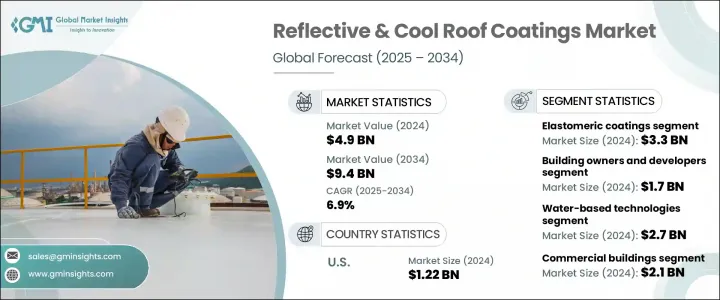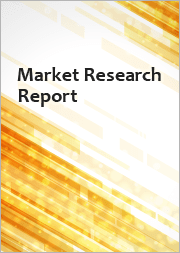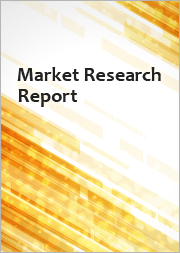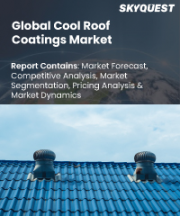
|
시장보고서
상품코드
1797728
반사 및 쿨 루프 코팅 시장 기회, 성장 촉진요인, 산업 동향 분석 및 예측(2025-2034년)Reflective and Cool Roof Coatings Market Opportunity, Growth Drivers, Industry Trend Analysis, and Forecast 2025 - 2034 |
||||||
세계의 반사 및 쿨 루프 코팅 시장은 2024년에는 49억 달러로 평가되었으며 CAGR 6.9%를 나타내 2034년에는 94억 달러에 이를 것으로 예측됩니다.
상업, 산업, 주택의 각 공간에서 에너지 효율을 향상시킬 필요성이 높아지고 있는 것이 시장 확대의 원동력이 되고 있습니다. 에너지 비용 상승과 지속 가능한 건축 기술에 대한 수요가 증가함에 따라 쿨 루프 페인트는 저렴한 고성능 솔루션으로 자리 잡고 있습니다. 이 페인트는 태양열 흡수를 최소화하여 실내 온도를 조정하고 에어컨에 대한 의존도를 낮추고 운영 비용을 줄입니다.

도시 지역에서는 기후가 뜨거워지고 에너지 가격이 상승하고 있기 때문에 채용이 급속히 진행되고 있습니다. 이산화탄소 배출과 관련된 환경에 대한 우려는 에너지 낭비를 줄이는 솔루션의 중요성을 더욱 강화하고 있습니다. 오래된 건물을 반사 페인트로 개조하는 것은 현대적인 인프라 업그레이드에서 널리 받아 들여지고 있습니다. 이 코팅은 태양전지판을 지원하는 지붕의 열 성능을 향상시키고 태양광 발전의 출력을 극대화하는 데에도 유용하다는 것이 입증되었습니다.
| 시장 범위 | |
|---|---|
| 시작 연도 | 2024년 |
| 예측 연도 | 2025-2034년 |
| 시작 금액 | 49억 달러 |
| 예측 금액 | 94억 달러 |
| CAGR | 6.9% |
그린 빌딩 정책과 ESG 컴플라이언스 목표에 의한 강력한 지원은 북미, 유럽, 아시아태평양을 포함한 세계 주요 지역 수요를 뒷받침하며 시장은 장기적으로 안정적인 성장을 이어가고 있습니다. 정부 및 산업 규제 당국은 에너지 효율적인 건축 기술을 적극적으로 장려하고 있으며, 반사 및 쿨 루프 코팅는 도시의 열을 줄이고 건물의 에너지 부하를 줄이고 탄소 발자국을 최소화하는 중요한 수단으로 인식되고 있습니다. 이러한 정책을 통해 공공 부문과 민간 부문 모두 인프라 업그레이드 및 신규 개발에 지속 가능한 코팅을 통합하는 것이 좋습니다.
엘라스토머 코팅 분야는 2024년에 33억 달러를 창출했고 2025년부터 2034년에 걸쳐 CAGR 6.5%를 나타낼 것으로 전망되고 있습니다. 엘라스토머계 및 아크릴계 쿨루프 페인트는 유연성, 내구성, 비용 효율성으로 시장을 독점하고 있습니다. 엘라스토머계 도료는 온도 변화, 자외선 노출, 악천후에 강하기 때문에 산업 시설이나 상업시설에서 널리 지지되고 있습니다. 한편, 아크릴계 도료는 반사율이 높고, 도포가 용이하고 유지보수가 최소한으로 끝나기 때문에 온난한 기후대의 주택에서 널리 채용되고 있습니다. 에너지 효율이 높은 지붕재에 대한 인식이 높아짐에 따라 이러한 도료에 대한 수요는 계속 급증하고 있습니다.
2024년에는 건물 소유자 및 개발자 부문에서 17억 달러의 매출이 기록되었습니다. 개발자와 부동산 소유자는 진화하는 에너지 규정을 충족하고 녹색 인증을 얻고 장기적인 광열비를 줄이기 위해 반사 형 지붕 페인트를 우선적으로 사용합니다. 이러한 코팅은 보다 광범위한 에너지 절약 전략의 일환으로 신축 및 리노베이션 인프라 모두에 통합되어 있습니다. 장기 운영 비용 절감, 환경 컴플라이언스, 건물 전반의 성능에 대한 주목 증가가 보급을 뒷받침하고 있습니다. 부동산 개발과 기후 변화에 대응하는 건축 관행이 증가함에 따라 이 사용자층은 앞으로도 시장 성장에 지배적인 역할을 할 것으로 예측됩니다.
2024년 미국의 반사 및 쿨 루프 코팅 시장 규모는 12억 2,000만 달러로 평가되었고, 2034년까지의 CAGR은 6.6%를 나타낼 것으로 예측됩니다. 북미는 정책지원, 전기요금 상승, 에너지효율기준의 광범위한 이행으로 계속해서 가장 큰 점유율을 차지하고 있습니다. 히트 아일랜드 삭감을 추진하는 지자체의 의무화와 반사형 솔루션을 지지하는 지역의 건축 기준법이 특히 도시에서 시장 침투를 가속화하고 있습니다. 지속가능한 재료의 사용을 장려하는 정책은 친환경 건물 인증에 대한 투자가 증가함에 따라 채용에 더욱 영향을 미치고 있습니다. 상업 건축의 확대, 에너지 가이드 라인 업데이트, 유리한 인센티브가 계속해서 수요를 자극하고 있습니다.
세계의 반사 및 쿨 루프 코팅 시장에 영향을 미치는 주요 기업은 AkzoNobel NV, BASF SE, 3M Company, The Dow Chemical Company, PPG Industries 등입니다. 이러한 기업들은 혁신, 세계 전개, 지속가능성에 중점을 둔 제품 개발을 통해 경쟁 구도를 결정하는 데 중요한 역할을 하고 있습니다. 시장 세분화 부문의 주요 기업은 시장에서의 존재감을 높이기 위해 다면적인 전략에 주력하고 있습니다. 여기에는 다양한 기후 조건 하에서 코팅의 내구성과 반사율을 높이기 위한 첨단 R&D 투자가 포함됩니다. 많은 기업들이 산업 지붕에서 주택까지 다양한 용도에 대응하기 위해 제품 라인을 확대하고 있으며, 동시에 진화하는 환경 규제에 대한 컴플라이언스를 확보하고 있습니다. 건설업자, 건축가, 정부 기관과의 전략적 파트너십은 녹색 건설 프로젝트에서 제품의 인지도와 사양을 개선하는 데 도움이 됩니다.
목차
제1장 조사 방법
- 시장의 범위와 정의
- 조사 디자인
- 조사 접근
- 데이터 수집 방법
- 데이터 마이닝 소스
- 세계
- 지역/국가
- 기본 추정과 계산
- 기준연도 계산
- 시장 예측의 주요 동향
- 1차 조사와 검증
- 1차 정보
- 예측 모델
- 조사의 전제와 한계
제2장 주요 요약
제3장 업계 인사이트
- 생태계 분석
- 공급자의 상황
- 이익률
- 각 단계에서의 부가가치
- 밸류체인에 영향을 주는 요인
- 파괴적 혁신
- 업계에 미치는 영향요인
- 성장 촉진요인
- 업계의 잠재적 위험 및 과제
- 시장 기회
- 성장 가능성 분석
- 규제 상황
- 북미
- 유럽
- 아시아태평양
- 라틴아메리카
- 중동 및 아프리카
- Porter's Five Forces 분석
- PESTEL 분석
- 가격 동향
- 지역별
- 제품별
- 향후 시장 동향
- 기술과 혁신의 상황
- 현재의 기술 동향
- 신흥기술
- 특허 상황
- 무역 통계(HS코드)(참고: 무역 통계는 주요 국가에서만 제공됨)
- 주요 수입국
- 주요 수출국
- 지속가능성과 환경 측면
- 지속가능한 관행
- 폐기물 감축 전략
- 생산에 있어서의 에너지 효율
- 환경 친화적인 노력
- 탄소발자국의 고려
제4장 경쟁 구도
- 서론
- 기업의 시장 점유율 분석
- 지역별
- 북미
- 유럽
- 아시아태평양
- 라틴아메리카
- 중동 및 아프리카
- 지역별
- 기업 매트릭스 분석
- 주요 시장 기업의 경쟁 분석
- 경쟁 포지셔닝 매트릭스
- 주요 발전
- 합병과 인수
- 파트너십 및 협업
- 신제품 발매
- 확장 계획
제5장 시장 추계·예측, 코팅 유형별(2021-2034년)
- 주요 동향
- 엘라스토머 코팅
- 아크릴 엘라스토머 코팅
- 실리콘 엘라스토머 코팅
- 폴리우레탄 엘라스토머 코팅
- 하이브리드 엘라스토머 시스템
- 아크릴 코팅
- 수성 아크릴 코팅
- 용제계 아크릴 코팅
- 고성능 아크릴 시스템
- 개질 아크릴 제형
- 실리콘 코팅
- 순수 실리콘 코팅
- 실리콘 개질 시스템
- 하이브리드 실리콘 제형
- 특수 실리콘 용도
- 알루미늄 기반 코팅
- 알루미늄 칩 코팅
- 알루미늄 안료 시스템
- 알루미늄 플레이크 제형
- 금속 반사 코팅
- 이산화티타늄계 코팅
- 루틸형 TIO2 제형
- 아나타제 TIO2 시스템
- 표면 처리된 TIO2 코팅
- 나노티오2 강화 제형
- 특수 및 고급 코팅
- 세라믹 기반 코팅
- 나노기술 강화 시스템
- 상변화물질 코팅
- 스마트 및 적응성 코팅
제6장 시장 추계·예측 : 기술별(2021-2034년)
- 주요 동향
- 수성 기반 기술
- 라텍스 기반 시스템
- 에멀젼 코팅
- 분산 기술
- 저-VOC 제형
- 용매 기반 기술
- 기존 용매 시스템
- 고체 제형
- VOC 시스템 감소
- 특수 용제 용도
- 분체 도장 기술
- 열경화성 분말 코팅
- 열가소성 분말 시스템
- UV 경화형 분말 코팅
- 기능성 분말 제형
- 나노기술 강화 시스템
- 나노 입자 강화 코팅
- 나노 구조 표면
- 자체 조립 시스템
- 다기능 나노 코팅
제7장 시장 추계·예측 : 용도별(2021-2034년)
- 주요 동향
- 상업 빌딩
- 오피스 빌딩
- 소매 센터 및 쇼핑몰
- 호텔 및 접객
- 의료시설
- 교육기관
- 데이터센터
- 주택
- 단독주택
- 집합 주택
- 콘도미니엄 및 아파트
- 조립식 주택
- 산업시설
- 제조 공장
- 창고 및 유통 센터
- 화학처리시설
- 식품가공공장
- 냉장시설
- 인프라
- 교통 인프라
- 정부청사
- 군사 및 방위 시설
- 유틸리티 및 발전
- 특수 용도
- 태양광 패널 설치
- 농업용 건물
- 스포츠 및 레크리에이션 시설
- 역사적 건축물 보존
제8장 시장 추계·예측 : 기능별(2021-2034년)
- 주요 동향
- 반사 기능
- 태양 반사율 최적화
- 근적외선 반사율
- 색안정성 반사시스템
- 고 반사율 제형
- 열 차단 기능
- 절연 코팅
- 열 브리징 감소
- 상변화 통합
- 복사 차단 시스템
- 방수 기능
- 심리스 멤브레인 시스템
- 균열 브리징 제형
- 엘라스토머 방수
- 액체 도포 멤브레인
- 다기능 시스템
- 반사+방수
- 열+보호 코팅
- 자체 청소+ 반사
- 항균+쿨 루프
제9장 시장 추계·예측 : 지붕 유형별(2021-2034년)
- 주요 동향
- 저경사 지붕
- 적층 지붕(BUR)
- 개질 역청 시스템
- 단층막 지붕
- 스프레이 폴리우레탄 폼(SPF)
- 금속 루핑 시스템
- 급경사 지붕
- 아스팔트 슁글 지붕
- 기와 지붕 시스템
- 금속 루핑 용도
- 슬레이트 및 천연석
- 목재 지붕 및 흔들림
- 특수 지붕 시스템
- 녹색 지붕 응용
- 태양광 발전 대응 지붕
- 쿨 메탈 지붕
- 반사막 시스템
제10장 시장 추계·예측 : 최종 용도별(2021-2034년)
- 주요 동향
- 건물 소유주 및 개발자
- 상업용 부동산 소유자
- 주거용 부동산 개발자
- 산업 시설 소유주
- 정부 및 공공 부문
- 루핑 계약자
- 상업용 루핑 사업자
- 주택 루핑 전문가
- 산업용 루핑 서비스
- 유지 보수 및 수리 계약자
- 시설 관리자
- 기업시설관리
- 부동산 관리 회사
- 유지보수 서비스 제산업체
- 에너지 관리 컨설턴트
- 정부 및 공적기관
- 연방 정부 시설
- 주정부 및 지방자치단체
- 교육기관
- 헬스케어 시스템
- 에너지 서비스 기업
- 퍼포먼스 계약
- 에너지 효율 개선
- 유틸리티 프로그램
- 그린 빌딩 컨설턴트
제11장 시장 추계·예측 : 지역별(2021-2034년)
- 주요 동향
- 북미
- 미국
- 캐나다
- 유럽
- 독일
- 영국
- 프랑스
- 이탈리아
- 스페인
- 기타 유럽
- 아시아태평양
- 중국
- 인도
- 일본
- 호주
- 한국
- 기타 아시아태평양
- 라틴아메리카
- 브라질
- 멕시코
- 아르헨티나
- 기타 라틴아메리카
- 중동 및 아프리카
- 사우디아라비아
- 남아프리카
- 아랍에미리트(UAE)
- 기타 중동 및 아프리카
제12장 기업 프로파일
- 3M Company
- AkzoNobel NV
- Axalta Coating Systems Ltd.
- BASF SE
- Chemours Company(Ti-Pure(TM))
- Covalba
- Enercool
- GoNano
- Hempel A/S
- Industrial Nanotech, Inc.
- Jotun A/S
- Kansai Paint Co., Ltd.
- NanoTech Materials Inc.
- National Coatings Corporation
- NEOtech Coatings
- Nippon Paint Holdings Co., Ltd.
- PPG Industries, Inc.
- Roofclix
- RPM International Inc.
- Sherwin-Williams Company
- The Dow Chemical Company
- Tikkurila Oyj
The Global Reflective & Cool Roof Coatings Market was valued at USD 4.9 billion in 2024 and is estimated to grow at a CAGR of 6.9% to reach USD 9.4 billion by 2034. A rising urgency to improve energy efficiency across commercial, industrial, and residential spaces is driving market expansion. Surging energy costs and the increasing demand for sustainable building technologies have positioned cool roof coatings as an affordable, high-performance solution. These coatings help regulate indoor temperatures by minimizing solar heat absorption, resulting in lower reliance on air conditioning and reduced operational expenses.

With urban areas experiencing hotter climates and energy prices spiking, adoption is accelerating rapidly. Environmental concerns linked to carbon emissions have further reinforced the importance of solutions that mitigate energy waste. Retrofitting older buildings with reflective coatings is becoming a widely accepted practice in modern infrastructure upgrades. These coatings are also proven valuable for improving the thermal performance of rooftops supporting solar panels, maximizing photovoltaic output.
| Market Scope | |
|---|---|
| Start Year | 2024 |
| Forecast Year | 2025-2034 |
| Start Value | $4.9 Billion |
| Forecast Value | $9.4 Billion |
| CAGR | 6.9% |
Strong support from green building policies and ESG compliance targets has helped fuel demand across key global regions, including North America, Europe, and Asia-Pacific, positioning the market for steady, long-term growth. Governments and industry regulators are actively incentivizing energy-efficient construction practices, with reflective and cool roof coatings recognized as a critical tool in reducing urban heat, lowering building energy loads, and minimizing carbon footprints. These policies are encouraging both public and private sectors to integrate sustainable coating into infrastructure upgrades and new developments.
The elastomeric coatings segment generated USD 3.3 billion in 2024 and is expected to grow at a CAGR of 6.5% between 2025 and 2034. Elastomeric and acrylic-based cool roof coatings are dominating the market due to their flexibility, durability, and cost-efficiency. Elastomeric coatings are widely favored in industrial and commercial facilities for their high resistance to temperature shifts, UV exposure, and severe weather. Acrylic coatings, on the other hand, are widely adopted in residential spaces in warm climate zones, primarily because they offer reliable reflectivity, are easy to apply, and require minimal maintenance. As awareness grows around energy-efficient roofing materials, demand for these coating types continues to surge.
In 2024, the building owners and developers segment generated USD 1.7 billion. Developers and property owners are prioritizing reflective roof coatings to meet evolving energy codes, support green certifications, and cut long-term utility costs. These coatings are being integrated into both new builds and retrofitted infrastructure as part of broader energy-saving strategies. Increased focus on long-term operational savings, environmental compliance, and overall building performance is encouraging widespread adoption. With rising real estate development and climate-responsive construction practices, this user segment is expected to continue playing a dominant role in market growth.
U.S. Reflective and Cool Roof Coatings Market generated USD 1.22 billion in 2024 and is forecast to grow at a CAGR of 6.6% through 2034. North America continues to be a leading contributor, with the U.S. holding the largest share due to policy support, rising electricity costs, and the broad implementation of energy efficiency standards. Municipal mandates promoting heat island reduction and local building codes favoring reflective solutions are accelerating market penetration, especially in urban regions. Policies encouraging the use of sustainable materials, along with increasing investments in green building certifications, are further influencing adoption. Expanding commercial construction, updated energy guidelines, and favorable incentives continue to stimulate demand.
The major players influencing the Global Reflective and Cool Roof Coatings Market include AkzoNobel N.V., BASF SE, 3M Company, The Dow Chemical Company, and PPG Industries. These companies play a crucial role in defining the competitive landscape through innovation, global reach, and sustainability-driven product development. To strengthen their market presence, leading companies in the reflective and cool roof coatings segment are focusing on multi-pronged strategies. These include investing in advanced R&D to enhance the durability and reflectivity of coatings under diverse climatic conditions. Many are expanding product lines to address various application segments-from industrial roofs to residential properties-while ensuring compliance with evolving environmental regulations. Strategic partnerships with builders, architects, and government bodies help increase product visibility and specification in green construction projects.
Table of Contents
Chapter 1 Methodology
- 1.1 Market scope and definition
- 1.2 Research design
- 1.2.1 Research approach
- 1.2.2 Data collection methods
- 1.3 Data mining sources
- 1.3.1 Global
- 1.3.2 Regional/Country
- 1.4 Base estimates and calculations
- 1.4.1 Base year calculation
- 1.4.2 Key trends for market estimation
- 1.5 Primary research and validation
- 1.5.1 Primary sources
- 1.6 Forecast model
- 1.7 Research assumptions and limitations
Chapter 2 Executive Summary
- 2.1 Industry 3600 synopsis
- 2.2 Key market trends
- 2.2.1 Regional
- 2.2.2 Coating type
- 2.2.3 Technology
- 2.2.4 Application
- 2.2.5 Function
- 2.2.6 Roof type
- 2.2.7 End use
- 2.3 TAM Analysis, 2021-2034
- 2.4 CXO perspectives: Strategic imperatives
- 2.4.1 Executive decision points
- 2.4.2 Critical success factors
- 2.5 Future outlook and strategic recommendations
Chapter 3 Industry Insights
- 3.1 Industry ecosystem analysis
- 3.1.1 Supplier landscape
- 3.1.2 Profit margin
- 3.1.3 Value addition at each stage
- 3.1.4 Factor affecting the value chain
- 3.1.5 Disruptions
- 3.2 Industry impact forces
- 3.2.1 Growth drivers
- 3.2.2 Industry pitfalls and challenges
- 3.2.3 Market opportunities
- 3.3 Growth potential analysis
- 3.4 Regulatory landscape
- 3.4.1 North America
- 3.4.2 Europe
- 3.4.3 Asia pacific
- 3.4.4 Latin America
- 3.4.5 Middle East & Africa
- 3.5 Porter's analysis
- 3.6 Pestel analysis
- 3.6.1 Technology and innovation landscape
- 3.6.2 Current technological trends
- 3.6.3 Emerging technologies
- 3.7 Price trends
- 3.7.1 By region
- 3.7.2 By product
- 3.8 Future market trends
- 3.9 Technology and innovation landscape
- 3.9.1 Current technological trends
- 3.9.2 Emerging technologies
- 3.10 Patent landscape
- 3.11 Trade statistics (hs code) (note: the trade statistics will be provided for key countries only)
- 3.11.1 Major importing countries
- 3.11.2 Major exporting countries
- 3.12 Sustainability and environmental aspects
- 3.12.1 Sustainable practices
- 3.12.2 Waste reduction strategies
- 3.12.3 Energy efficiency in production
- 3.12.4 Eco-friendly initiatives
- 3.13 Carbon footprint considerations
Chapter 4 Competitive Landscape, 2024
- 4.1 Introduction
- 4.2 Company market share analysis
- 4.2.1 By region
- 4.2.1.1 North America
- 4.2.1.2 Europe
- 4.2.1.3 Asia Pacific
- 4.2.1.4 LATAM
- 4.2.1.5 MEA
- 4.2.1 By region
- 4.3 Company matrix analysis
- 4.4 Competitive analysis of major market players
- 4.5 Competitive positioning matrix
- 4.6 Key developments
- 4.6.1 Mergers & acquisitions
- 4.6.2 Partnerships & collaborations
- 4.6.3 New product launches
- 4.6.4 Expansion plans
Chapter 5 Market Estimates & Forecast, Coating Type, 2021-2034 (USD Billion) (Kilo Tons)
- 5.1 Key trends
- 5.2 Elastomeric coatings
- 5.2.1 Acrylic elastomeric coatings
- 5.2.2 Silicone elastomeric coatings
- 5.2.3 Polyurethane elastomeric coatings
- 5.2.4 Hybrid elastomeric systems
- 5.3 Acrylic coatings
- 5.3.1 Water-based acrylic coatings
- 5.3.2 Solvent-based acrylic coatings
- 5.3.3 High-performance acrylic systems
- 5.3.4 Modified acrylic formulations
- 5.4 Silicone coatings
- 5.4.1 Pure silicone coatings
- 5.4.2 Silicone-modified systems
- 5.4.3 Hybrid silicone formulations
- 5.4.4 Specialty silicone applications
- 5.5 Aluminum-based coatings
- 5.5.1 Aluminum chip coatings
- 5.5.2 Aluminum pigment systems
- 5.5.3 Aluminum flake formulations
- 5.5.4 Metallic reflective coatings
- 5.6 Titanium dioxide-based coatings
- 5.6.1 Rutile TIO2 formulations
- 5.6.2 Anatase TIO2 systems
- 5.6.3 Surface-treated TIO2 coatings
- 5.6.4 Nano-tio2 enhanced formulations
- 5.7 Specialty and advanced coatings
- 5.7.1 Ceramic-based coatings
- 5.7.2 Nanotechnology-enhanced systems
- 5.7.3 Phase change material coatings
- 5.7.4 Smart and adaptive coatings
Chapter 6 Market Estimates & Forecast, By Technology, 2021-2034 (USD Billion) (Kilo Tons)
- 6.1 Key trends
- 6.2 Water-based technologies
- 6.2.1 Latex-based systems
- 6.2.2 Emulsion coatings
- 6.2.3 Dispersion technologies
- 6.2.4 Low-VOC formulations
- 6.3 Solvent-based technologies
- 6.3.1 Conventional solvent systems
- 6.3.2 High-solids formulations
- 6.3.3 Reduced VOC systems
- 6.3.4 Specialty solvent applications
- 6.4 Powder coating technologies
- 6.4.1 Thermosetting powder coatings
- 6.4.2 Thermoplastic powder systems
- 6.4.3 UV-curable powder coatings
- 6.4.4 Functional powder formulations
- 6.5 Nanotechnology-enhanced systems
- 6.5.1 Nanoparticle-enhanced coatings
- 6.5.2 Nanostructured surfaces
- 6.5.3 Self-assembling systems
- 6.5.4 Multifunctional nanocoating
Chapter 7 Market Estimates & Forecast, By Application, 2021-2034 (USD Billion) (Kilo Tons)
- 7.1 Key trends
- 7.2 Commercial buildings
- 7.2.1 Office buildings
- 7.2.2 Retail centers and malls
- 7.2.3 Hotels and hospitality
- 7.2.4 Healthcare facilities
- 7.2.5 Educational institutions
- 7.2.6 Data centers
- 7.3 Residential buildings
- 7.3.1 Single-family homes
- 7.3.2 Multi-family housing
- 7.3.3 Condominiums and apartments
- 7.3.4 Manufactured housing
- 7.4 Industrial facilities
- 7.4.1 Manufacturing plants
- 7.4.2 Warehouses and distribution centers
- 7.4.3 Chemical processing facilities
- 7.4.4 Food processing plants
- 7.4.5 Cold storage facilities
- 7.5 Infrastructure applications
- 7.5.1 Transportation infrastructure
- 7.5.2 Government buildings
- 7.5.3 Military and defense facilities
- 7.5.4 Utility and power generation
- 7.6 Specialty applications
- 7.6.1 Solar panel installations
- 7.6.2 Agricultural buildings
- 7.6.3 Sports and recreation facilities
- 7.6.4 Historic building preservation
Chapter 8 Market Estimates & Forecast, By Function, 2021-2034 (USD Billion) (Kilo Tons)
- 8.1 Key trends
- 8.2 Reflective function
- 8.2.1 Solar reflectance optimization
- 8.2.2 Near-infrared reflectance
- 8.2.3 Color-stable reflective systems
- 8.2.4 High-sri formulations
- 8.3 Thermal barrier function
- 8.3.1 Insulative coatings
- 8.3.2 Thermal bridging reduction
- 8.3.3 Phase change integration
- 8.3.4 Radiant barrier systems
- 8.4 Waterproofing function
- 8.4.1 Seamless membrane systems
- 8.4.2 Crack-bridging formulations
- 8.4.3 Elastomeric waterproofing
- 8.4.4 Liquid-applied membranes
- 8.5 Multi-functional systems
- 8.5.1 Reflective + waterproofing
- 8.5.2 Thermal + protective coatings
- 8.5.3 Self-cleaning + reflective
- 8.5.4 Anti-microbial + cool roof
Chapter 9 Market Estimates & Forecast, By Roof Type, 2021-2034 (USD Billion) (Kilo Tons)
- 9.1 Key trends
- 9.2 Low-slope roofs
- 9.2.1 Built-up roofing (BUR)
- 9.2.2 Modified bitumen systems
- 9.2.3 Single-ply membrane roofs
- 9.2.4 Spray polyurethane foam (SPF)
- 9.2.5 Metal roofing systems
- 9.3 Steep-slope roofs
- 9.3.1 Asphalt shingle roofs
- 9.3.2 Tile roofing systems
- 9.3.3 Metal roofing applications
- 9.3.4 Slate and natural stone
- 9.3.5 Wood shingle and shake
- 9.4 Specialty roof systems
- 9.4.1 Green roof applications
- 9.4.2 Solar-ready roofing
- 9.4.3 Cool metal roofing
- 9.4.4 Reflective membrane systems
Chapter 10 Market Estimates & Forecast, By End Use, 2021-2034 (USD Billion) (Kilo Tons)
- 10.1 Key trends
- 10.2 Building owners and developers
- 10.2.1 Commercial real estate owners
- 10.2.2 Residential property developers
- 10.2.3 Industrial facility owners
- 10.2.4 Government and public sector
- 10.3 Roofing contractors
- 10.3.1 Commercial roofing contractors
- 10.3.2 Residential roofing specialists
- 10.3.3 Industrial roofing services
- 10.3.4 Maintenance and restoration contractors
- 10.4 Facility managers
- 10.4.1 Corporate facility management
- 10.4.2 Property management companies
- 10.4.3 Maintenance service providers
- 10.4.4 Energy management consultants
- 10.5 Government and public agencies
- 10.5.1 Federal government facilities
- 10.5.2 State and local government
- 10.5.3 Educational institutions
- 10.5.4 Healthcare systems
- 10.6 Energy service companies
- 10.6.1 Performance contracting
- 10.6.2 Energy efficiency retrofits
- 10.6.3 Utility programs
- 10.6.4 Green building consultants
Chapter 11 Market Estimates & Forecast, By Region, 2021-2034 (USD Billion) (Kilo Tons)
- 11.1 Key trends
- 11.2 North America
- 11.2.1 U.S.
- 11.2.2 Canada
- 11.3 Europe
- 11.3.1 Germany
- 11.3.2 UK
- 11.3.3 France
- 11.3.4 Italy
- 11.3.5 Spain
- 11.3.6 Rest of Europe
- 11.4 Asia Pacific
- 11.4.1 China
- 11.4.2 India
- 11.4.3 Japan
- 11.4.4 Australia
- 11.4.5 South Korea
- 11.4.6 Rest of Asia Pacific
- 11.5 Latin America
- 11.5.1 Brazil
- 11.5.2 Mexico
- 11.5.3 Argentina
- 11.5.4 Rest of Latin America
- 11.6 Middle East & Africa
- 11.6.1 Saudi Arabia
- 11.6.2 South Africa
- 11.6.3 UAE
- 11.6.4 Rest of Middle East & Africa
Chapter 12 Company Profiles
- 12.1 3M Company
- 12.2 AkzoNobel N.V.
- 12.3 Axalta Coating Systems Ltd.
- 12.4 BASF SE
- 12.5 Chemours Company (Ti-Pure™)
- 12.6 Covalba
- 12.7 Enercool
- 12.8 GoNano
- 12.9 Hempel A/S
- 12.10 Industrial Nanotech, Inc.
- 12.11 Jotun A/S
- 12.12 Kansai Paint Co., Ltd.
- 12.13 NanoTech Materials Inc.
- 12.14 National Coatings Corporation
- 12.15 NEOtech Coatings
- 12.16 Nippon Paint Holdings Co., Ltd.
- 12.17 PPG Industries, Inc.
- 12.18 Roofclix
- 12.19 RPM International Inc.
- 12.20 Sherwin-Williams Company
- 12.21 The Dow Chemical Company
- 12.22 Tikkurila Oyj



















